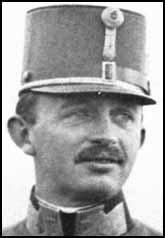Karl I

Karl I was born in 1887. He joined the Austro-Hungarian Army and was a cavalry officer until the assassination of his uncle, Archduke Franz Ferdinand, in 1914, left him heir to the throne.
In the First World War Karl commanded a corps on the Italian Front until being sent to Galicia to halt the Brusilov Offensive during the summer of 1916. On the death of Franz Josef on 21st November, 1916, Karl became the Emperor of Austria and King of Hungary.
Karl held liberal views and introduced a series of reforms including the abolition of flogging in the army, halting strategic bombing and restricted the use of poison gas. These measures upset his military commanders who felt Karl's reforms were undermining their attempts to win the war.
Unlike his chief of staff, Count Conrad von Hotzendorf, Karl favoured a negotiated peace settlement. He also wanted more personal control over the Austro-Hungarian forces and in March 1917 he sacked Conrad and replaced him with Arz von Straussenberg.
Approaches made by Karl's diplomats offering peace negotiations were rejected by the Allies. Nationalistic unrest in the Imperial & Royal Army intensified after the Allied victory at Vittorio Veneto. Karl accepted the inevitable and on 31st October he permitted his soldiers to join the individual national armies.
On the defeat of the Central Powers in November, 1918, Karl abdicated and fled to Switzerland. Karl died in 1922.
